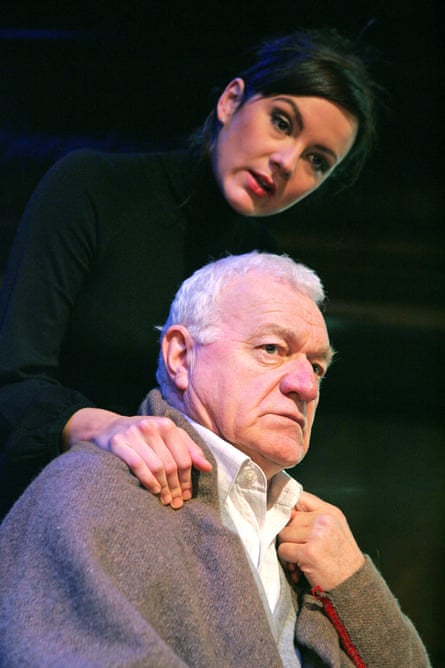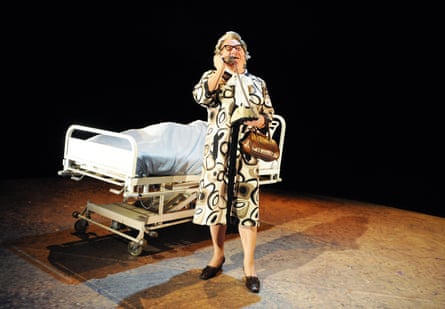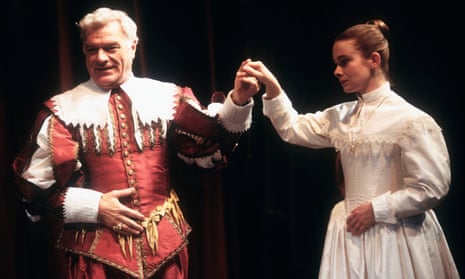The commanding actor Philip Voss, who has died of cancer and complications from Covid-19 aged 84, was renowned for his style and accomplishment as an always handsome presence on the stage, with wonderful vocal skills and unimpeachable diction.
Commenting on his 1981 performance – “the best since George Devine” 17 years earlier – as the doctor, Dorn, in Chekhov’s The Seagull, the critic Robert Cushman also noted that Voss was a link to the high-comedy tradition in the British theatre without being a throwback; he never sounded old-fashioned.
The Chekhov was one of an outstanding roster of productions in that decade (1975-85) with the Shared Experience theatre company of director Mike Alfreds, a period Voss described as his “happiest and most productive years in the theatre”, during which he appeared in classic revivals of Marivaux’s Les Fausses Confidences, Gogol’s Marriage (in this, one of Chekhov’s favourite plays, Voss was a hilarious and predatory matchmaker) and an all-grey, wittily conceived version of Evelyn Waugh’s A Handful of Dust.
Alfreds and Shared Experience were a breath of fresh air, and hugely influential in their use of third-person narrative (their cut-price version of Bleak House preceded the Royal Shakespeare Company’s Nicholas Nickleby by a couple of years and was produced on the same principle of actors sharing the narrative while dodging in and out of character), and in their fast, flexible staging, with beautiful costumes.

Voss, magnificently imposing – big voice, big head, big presence, but a wicked twinkle about him, too – was an anchor in a company of exceptional actors.
He went with Alfreds to the National Theatre in 1987 to form a new in-house ensemble – including Siân Thomas, Mark Rylance and Sylvestra Le Touzel – to mount two ambitious five-hour epics. In an adaptation of Eugène Sue’s 1844 novel The Wandering Jew, Voss was a killer Jesuit in a tale of a viciously contested fortune, “resembling some hissing sclerotic reptile”, said the critic Peter Kemp; and in Goldoni’s landmark trilogy La Villeggiatura, or Countrymania, he was a grandiloquent, heroic sponger in scenes satirising the hedonistic carnivals and banquets in Venice.
Voss went on to play major roles with the RSC in the 1990s before a return to the National in the new millennium. His television career had begun in the first (1963) season of Doctor Who, with William Hartnell, as Acomat, the leader of Mongolian bandits, in the Marco Polo story, and as a young Dulcian, Wahed, a humanoid pacifist killed by Quarks, a few years later, with Patrick Troughton as the second doctor. His last television role was as Ian McKellen’s acid-tongued brother, Mason, in the sitcom Vicious (2013-16).
Voss was born in Leicester, the elder son of James Voss, a pharmacist, and his wife, Viola (nee Walmsley). When the family moved to the village of Wollaton, near Nottingham, Philip attended the city’s High Pavement school. He joined a local amateur theatre and, after national service with the RAF, trained for the stage at Rada. He worked in rep, as well as in television, in the 1960s, playing Henry V and appearing in The Happiest Days of Your Life at the Hornchurch Rep, and Sparkish in The Country Wife for the director Giles Havergal at the Watford Palace.
In the late 1970s he was also a member of the BBC Radio Drama Company, working with the directors Jane Morgan and Celia De Wolff, in subsequent years, on The Lord of the Rings (he was Lord of the Nazgûl), Carey Harrison’s trilogy The Sea Voyage and as George Dillingham in David Garnett’s Aspects of Love. On film, he popped up in Octopussy (1983) with Roger Moore as James Bond, Trevor Nunn’s Lady Jane (1986), Bob Rafelson’s Mountains of the Moon (1990) and as Laura’s father in Four Weddings and a Funeral (1994).
But theatre was his oxygen, and he needed the “live” room.
At the RSC through the 1990s, he at last played the great leads as of right: a supple, humorous Menenius to Toby Stephens’s boyish, febrile Coriolanus; a voluptuous, mincingly fastidious Sir Epicure Mammon in Ben Jonson’s The Alchemist (directed by Sam Mendes); an ideal Ulysses, relishing every syllable, in Troilus and Cressida (Joseph Fiennes and Victoria Hamilton); a spinsterish Malvolio; and a grave and weighty Shylock. He was a shrewd old fox of a Prospero in The Tempest on tour.

Voss returned to the National in 2002 as an impoverished yet uproarious old count in Chekhov’s Ivanov, directed by Katie Mitchell, and was the perfect Boyet in Trevor Nunn’s idyllic Love’s Labour’s Lost. For Peter Hall at the Theatre Royal, Bath, he was a scruffy, vituperative Jaques in As You Like It in 2003 and, in 2011, a wily Worcester and a gullible old Shallow in the two parts of Henry IV.
In or out of hose, he was always modern, and direct. He graced new plays by Antony Sher (The Giant at Hampstead in 2007, with Leonardo and the firebrand Michelangelo competing to carve David), Alexi Kaye Campbell (Apologia at the Bush, also in 2007, as a camp old campaigning friend of Paola Dionisotti’s radical art historian) and Jonathan Harvey (Canary in 2010 at the Liverpool Everyman, in which he played both Mary Whitehouse and a closet gay police chief).
In the early 1970s, he settled in Bushey, Hertfordshire, with his longstanding partner, the writer John Peacock, with whom he shared his passions for gardening and music. They entered into a civil partnership in 2006. John died in 2017. He is survived by his younger brother, John.

Comments (…)
Sign in or create your Guardian account to join the discussion